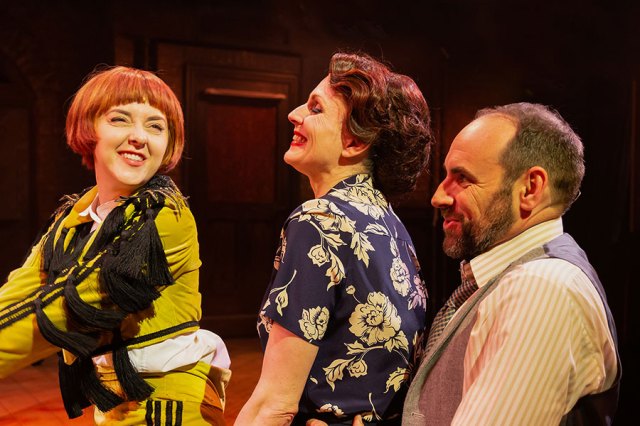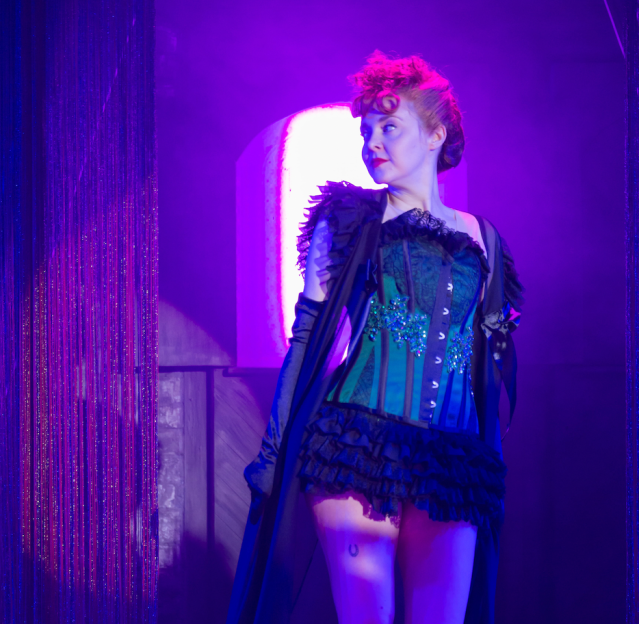Gypsy review: an inspired production of a near-perfect musical
The Mill at Sonning hosts a new revival starring Rebecca Thornhill and Evelyn Hoskins

Although Broadway aficionados joke that they get revivals of Gypsy so frequently that another one is surely due any year now, UK productions of this revered American classic are much rarer. It took 14 years for it to cross the Atlantic for a 1973 West End premiere featuring Angela Lansbury and a child star Bonnie Langford, and there has only been one London revival, when the Imelda Staunton-led Chichester staging charged into the Savoy in 2015.
However, like buses, you wait for ages for a chance to see Gypsy then two come along at once, if you’re prepared to travel. Hot on the toe-shoed heels of the critically acclaimed Pitlochry Festival Theatre production comes Joseph Pitcher’s exhilarating staging for the Mill at Sonning. It’s an atmospheric, imaginative version that paints this immaculately constructed slice of showbiz heaven, based on a real life story and characters, in bold, bright new colours.
Pitcher and his first rate team (set designer Jason Denvir, costumes by Natalie Titchener, Nic Farman – lighting, Francis Goodhand – arrangements and MD, all delivering world class work) aren’t trying to reinvent the wheel here (there’s no need, as this is possibly the most perfectly constructed show in the entire trad musical theatre canon) but they polish it up to a brilliant sheen, and invest it with a couple of fresh insights. The biggest surprise may be that, although Gypsy is generally perceived as a big lavish show, it really works best when done small but perfectly formed, as it is here.
It’s easy to forget, after the starry, big budget productions and two film versions, that the vast majority of the piece consists of scenes between a handful of people. The reduced scale of this version illuminates those characters, their motivations, quirks and relationships, without sacrificing any of the excitement and exuberance that make this bittersweet examination of soured motherly love and the painful demands of show-business so compulsive. Encountering it at close quarters is also to appreciate even more how intelligently put together the piece itself is, how seamlessly songs and script meld into each other, and how intricately written the characters are. The storytelling is a triumph of discreet stagecraft: witness the second act section where Louise’s journey from terrified performing neophyte to confident, successful burlesque artiste (i.e. stripper) under the stage name Gypsy Rose Lee is conveyed by a series of increasingly extravagantly costumed snippets from her act, each time presented with more confidence and more elaborate effects. It’s simultaneously filmic in its slickness but innately theatrical in its impact.
It’s a masterpiece, from Arthur Laurents’s dynamic, ballsy script, to Jule Styne’s brassy but haunting music and Stephen Sondheim’s inspired lyrics, ripe with sass and feeling. There isn’t a single extraneous line of dialogue here, nor a wasted moment, even the most minor song is an outright winner, while the best known (“Some People”, “Everything’s Coming Up Roses”, “Together Wherever We Go”, “Let Me Entertain You”, “If Momma Was Married”, the list goes on…) are woven into the very fabric, consciousness and history of Broadway.
Pitcher provides the classy, inventive choreography, as well as the direction, and it’s all just wonderful. Gypsy has one of the most adored overtures of any musical and, mindful that the band here, glorious as they are, can’t compete with the full scale brassy orchestras of yore, Pitcher instead animates the whole opening section, filling the stage with twirling dancers, excitable children, irascible stagehands, creating the seedy backstage magic of old school vaudeville. At the height of all this, Evelyn Hoskins’s Gypsy Rose Lee, nee Louise, stalks on in full glamour mode, stopping to stare briefly at her younger self (Aimee Brain at the performance I saw) before sashaying onwards. It’s a spine-tingling effect, and becomes a recurring motif that underlines the idea of the child inside the adult, that runs throughout the show.

It’s not the only thing that astounds: we learn early on that Mama Rose’s own mother walked out on her as a child, and there’s an astonishing moment during Rebecca Thornhill’s barnstorming rendition of the climactic “Rose’s Turn”, when the iconic, heightened repetition of the word “mama”, usually signifying emotional breakdown, suggests that this particular Rose is, in a state of distress, crying out for the mother that abandoned her. It’s a fleeting, blink-and-you’ll-miss-it touch but it chills the blood and imbues this already multi-layered character with even more depth.
Thornhill is not a typical Rose, she’s far from the bulldozer in a dress that many actresses portray, but it’s an authentic star performance. This is a still-beautiful woman of formidable energy and determination, who lives on her nerves, and is willing to use her sexual allure to get her own way for herself and her babies. More than any other Rose I’ve seen, this one convinces as somebody who really could and should have achieved the stardom for herself that she craves for her favourite daughter (Marina Tavolieri’s sensational June), and that, along with an almost manic fear of abandonment, is her biggest tragedy, or it is until she has alienated everyone she loves. When, after “Rose’s Turn” Louise says to her, “you really would have been something, mother” you don’t doubt it for a moment. Thornhill’s Rose moves with the lithe grace of a dancer, belts like a diva and cloaks her steel in honey, elegance and unexpected vulnerability. She’s nothing like Merman, Lansbury or Staunton, but she is unforgettable.
Hoskins is equally magnetic as a Louise who blossoms satisfyingly while remaining acutely aware of the price of fame. Initially wide-eyed but old beyond her years, slumped in passive resignation at always playing second fiddle to her more flamboyant sibling, she makes the transformation into showbiz swan something triumphant but also unsettling in its sense of innocence lost. Vocally, she’s divine.
The rest of the company are similarly worthy of all the superlatives, from Daniel Crowder who finds a dark edge to a more attractive-than-usual Herbie, who adores Rose but ultimately can’t cover with her, to Charlie Waddell, a stunning triple threat as the captivating chorus boy with big dreams who gives Louise her first taste of heartache, and, at the performance I saw, Mia Burton as a hysterical, terrifyingly precocious Baby June. Tavolieri also looks like a star about to happen. Laura Tyrer, Susannah Van Den Berg and Natalie Winsor are a knockout in triplicate as the unholy trinity of strippers who alternately belt, bump and bawl their way through the legendary showstopper “You Gotta Get A Gimmick”.
A renovated mill on a picturesque islet in the Thames in one of the most idyllic parts of rural Oxfordshire may be worlds away from the intensity and bustle of Manhattan but the Broadway level energy and know-how on display here right now is transformative. Is Gypsy the perfect musical? It’s hard to say for sure, but this inspired production makes a very strong case for it. Plus you get dinner (or lunch at matinees)…what’s not to love? Literally nothing.
















